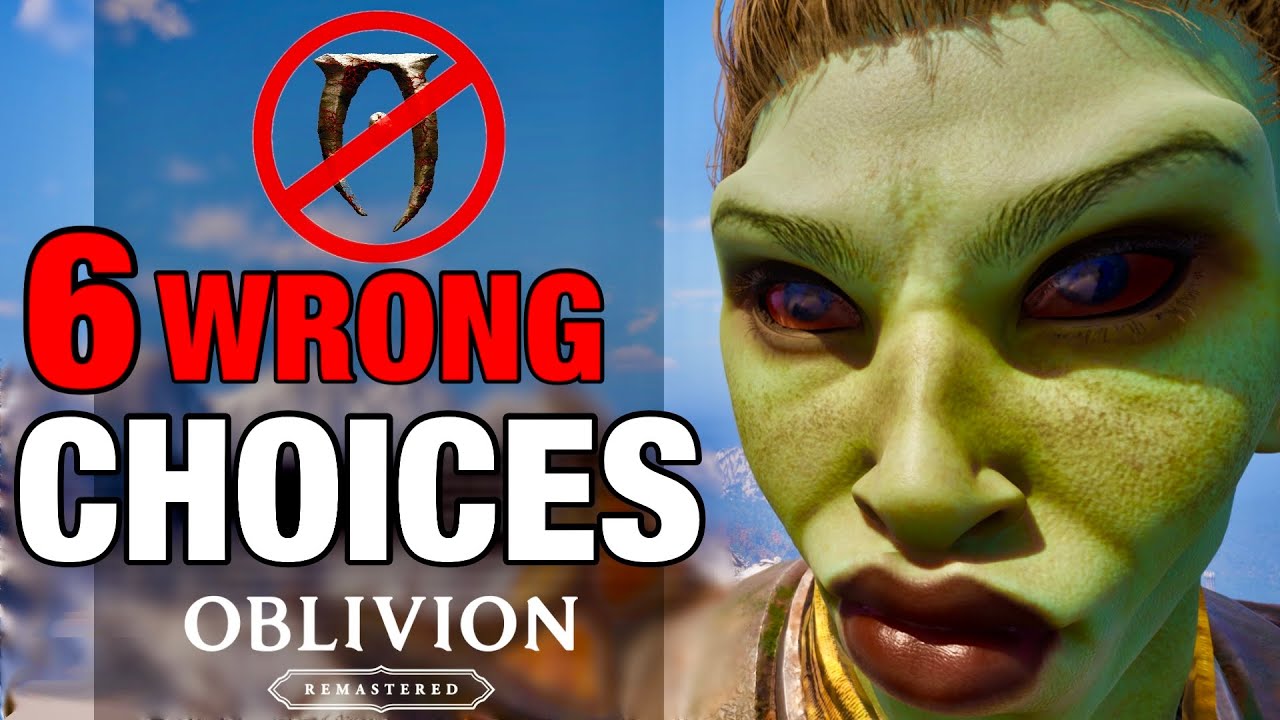The Elder Scrolls IV: Oblivion Remastered, released on April 22, 2025, for PC, PS5, and Xbox Series X|S, brings Bethesda’s 2006 classic into the modern era with Unreal Engine 5 visuals, refined mechanics, and the same sprawling open world that defined a generation of RPGs. As you step into Cyrodiil to thwart the Mythic Dawn and close the Oblivion Gates, the game’s freedom can be both a blessing and a curse. With countless quests, guilds, and character builds, it’s easy to make choices that hinder your progress or diminish the experience. Whether you’re a newcomer or a veteran returning to Tamriel, avoiding these six wrong choices will ensure your journey as the Champion of Cyrodiil is as epic as intended. Here’s what to steer clear of and why these mistakes could derail your adventure.

1. Rushing the Main Quest Without Side Exploration
One of the biggest mistakes is prioritizing the main quest over Cyrodiil’s vast side content. After escaping the Imperial City sewers, you’re tasked with delivering an amulet to Jauffre, kicking off the battle against Mehrunes Dagon’s forces. However, rushing through this storyline triggers more Oblivion Gates, spawning tougher Daedric enemies that scale with your level. This can make the world feel overwhelming, especially if you’re underleveled or underequipped. Instead, delay the main quest and dive into side quests like the Fighters Guild, Mages Guild, or Dark Brotherhood. These offer XP, gold, and gear—like the Chillrend sword from the Thieves Guild—that make main quest battles, such as retaking Kvatch, more manageable. Exploring cities like Anvil or Skingrad also uncovers unique quests, such as “Paranoia,” which reward gold and memorable NPC interactions. Balancing exploration with story progression keeps the game’s difficulty in check and enriches your experience with Cyrodiil’s lore.
2. Ignoring Guild Quest Order to Avoid Conflicts
Joining multiple guilds is a hallmark of Oblivion, but tackling their quests in the wrong order can lead to bugs or expulsion. For example, a Mages Guild member is involved in a Thieves Guild quest, and completing Mages Guild tasks first might get you expelled from the Mages Guild due to overlapping NPC interactions. To avoid this, finish the Thieves Guild questline before joining the Mages Guild. Similarly, the “Sins of the Father” quest can lock out Thieves Guild progress if you make certain choices, as a key NPC may refuse to speak to you. Start with Sanguine’s Daedric quest, then complete Thieves Guild, followed by Mages Guild, to minimize conflicts. Saving before major quest decisions also lets you explore outcomes without soft-locking progress. This strategic approach, informed by player discussions on optimal quest sequencing, ensures a smoother, bug-free guild experience, especially given the remaster’s retained volatility.
3. Neglecting to Save Frequently
Oblivion Remastered is notorious for its bugs, from disappearing Oblivion Gates to broken quest objectives, despite Virtuos’s efforts to polish the game. Failing to save often can cost you hours of progress, especially during risky activities like lockpicking or dungeon crawling. For instance, a failed lockpick attempt on a five-pin lock can break your last pick, leaving you stuck, or an unexpected enemy ambush in a place like Vilverin can wipe out an unprepared character. Save before entering new areas, attempting minigames, or making quest choices, such as accusing NPCs in the “Paranoia” quest. The remaster’s autosave is helpful, but manual saves at key moments—like before confronting Agarmir in “Unfriendly Competition”—offer a safety net. Frequent saving, often called “save scumming” by players, is an unwritten rule that transforms potential frustration into freedom, letting you experiment without fear of setbacks.
4. Overusing Fast Travel and Missing World Details
The temptation to fast travel across Cyrodiil’s map is strong, especially with the remaster’s streamlined UI. However, overusing it robs you of Oblivion’s worldbuilding magic. Random encounters, like stumbling upon the invisible residents of Aleswell in the “Zero Visibility” quest, often lead to unique rewards, such as a free room at Aleswell Inn. Exploring on foot or horseback reveals hidden caves, Ayleid ruins, and NPCs with quest hints, like Glarthir in Skingrad. The remaster’s Unreal Engine 5 visuals make Cyrodiil’s forests, lakes, and cities—like the bustling Imperial City—worth savoring. Fast travel is best reserved for revisiting known locations, not discovering new ones. Pacing yourself and embracing the journey, as recommended by seasoned players, ensures you don’t miss out on Oblivion’s best moments, from chance bandit encounters to serene vistas.
5. Choosing a Poor Character Build
Oblivion Remastered offers 21 classes and customizable origins, but a poorly planned build can make combat and exploration frustrating. For example, picking a class like Mage without balancing combat skills can leave you vulnerable to tanky enemies like vampires, especially on higher difficulties. The remaster’s updated leveling system lets you allocate attribute points more flexibly, but major skills still determine level-ups. Avoid spreading points too thinly across unrelated skills, like mixing Blade, Sneak, and Destruction without synergy. Instead, choose a focused class—Assassin for stealth and ranged combat, Warrior for melee, or Sorcerer for magic with heavy armor—and pair it with a complementary race and birthsign, such as an Orc with The Warrior sign for melee boosts. Testing your build in the tutorial and tweaking it before leaving the sewers, as the game allows, prevents long-term struggles, particularly against scaled enemies in Oblivion Gates.
6. Ignoring Diseases and Infamy Consequences
Failing to monitor diseases and infamy is a subtle but costly mistake. Fighting vampires or their thralls can inflict Porphyric Hemophilia, which turns you into a vampire after three days if untreated. Vampirism, while intriguing, imposes sunlight damage and NPC hostility, complicating gameplay without preparation. Cure it early with potions, Cure Disease spells, or shrine visits, like the Altar of the Nine in city chapels. Similarly, accumulating infamy through Thieves Guild quests, Dark Brotherhood assassinations, or bounties can lock you out of divine altars if it exceeds your fame. This restricts access to healing and buffs, critical for tough fights. Complete the Knights of the Nine pilgrimage to reset infamy, and prioritize fame-building quests, like aiding Kvatch, early on. Tracking fame and infamy in the statistics menu and addressing diseases promptly, as advised by community guides, keeps your character versatile and unhindered.
Why These Choices Matter
These six mistakes—rushing the main quest, ignoring guild quest order, neglecting saves, overusing fast travel, choosing a poor build, and ignoring diseases/infamy—can transform Oblivion Remastered’s freedom into frustration. The game’s open world, while stunning in its Unreal Engine 5 overhaul, retains the original’s jank, with bugs and unforgiving systems that punish unprepared players. For example, the remaster’s enemy scaling, though slightly tweaked, still makes high-level areas deadly without proper gear or levels, amplifying the impact of rushing the main quest or a weak build. Guild conflicts and bugs, as noted in player discussions, remain a challenge, making quest order and frequent saves essential. Overusing fast travel diminishes the remaster’s visual splendor, while diseases and infamy can lock you out of key mechanics, limiting role-playing options.
Avoiding these pitfalls enhances both enjoyment and efficiency. Side quests and guild progression provide XP and items—like the Azura’s Star from Daedric quests—that ease main story challenges. Strategic quest ordering prevents expulsion or soft-locks, preserving access to guild benefits like Mages Guild spellcrafting. Frequent saves mitigate the remaster’s persistent bugs, such as quest NPCs vanishing, while exploring on foot uncovers Cyrodiil’s charm, from Sheogorath’s quirky Shivering Isles to the eerie Fort Farragut. A balanced build ensures combat viability, especially on Adept difficulty, where enemies deal equal damage, and proactive disease/infamy management keeps your character flexible for any playstyle—warrior, thief, or mage.
Tips to Stay on Track
To sidestep these errors, adopt a few habits. Save before every major action, from lockpicking to quest dialogues, and keep multiple save files. Explore guilds early, starting with Thieves Guild to unlock fences for stolen goods, and follow the recommended quest order: Sanguine’s quest, Thieves Guild, then Mages Guild. Use the local map (zoom in fully on the world map) to navigate towns and dungeons, reducing reliance on fast travel. Check your journal for disease notifications after vampire encounters, and visit chapels or alchemists for cures. For builds, test synergies in the tutorial—pair Sneak with Marksman for Assassins or Heavy Armor with Destruction for Spellswords—and adjust before exiting the sewers. Finally, pace your main quest progress by completing one or two side quests per main objective, ensuring you’re leveled and equipped for Oblivion Gates.
Conclusion
The Elder Scrolls IV: Oblivion Remastered is a triumphant return to Cyrodiil, blending nostalgic charm with modern polish. However, its freedom comes with traps that can derail even seasoned adventurers. By avoiding these six wrong choices—rushing the main quest, ignoring guild quest order, neglecting saves, overusing fast travel, choosing a poor build, and ignoring diseases/infamy—you’ll unlock the full potential of this landmark RPG. Embrace Cyrodiil’s quirks, from its radiant AI to its janky NPC faces, and approach each decision with care. Whether you’re sneaking through the Dark Brotherhood’s sanctum or battling Daedra at the Great Gate, these tips will keep your journey thrilling and seamless. So, grab your sword, save your game, and explore Tamriel’s heart—you’ll see why Oblivion Remastered is captivating players anew.





